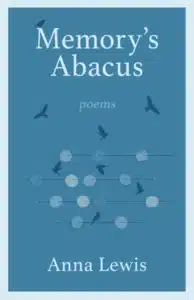Anna Lewis has written a moving first collection of poetry
One of the strongest memories I have of my paternal grandmother is her writing the notes for the ladies’ Sunday School lesson she’d be teaching on the coming Sunday. She’d sit in the easy chair in her large bedroom, intently writing in her small, ringed, black leather notebook, completely focused on the task at hand. I’d sit quietly nearby, reading my book and occasionally looking up to watch her. I knew not to disturb her while she prepared her lesson. As she wrote, she’d occasionally mention names of ladies in the class, as if anticipating their questions.
I was reminded of this while reading Memory’s Abacus, the new (and first) poetry collection by Anna Lewis. In the title poem, she recounts a memory of her grandmother tapping her fingers on the Christmas tablecloth, speaking the name of one of her 10 cousins with each tap. “Dispersed now or dead, her childhood kin / reunite as a line of names / along her swollen knuckles.” Associating the tapping and reciting of family names with an abacus is an image almost crystallized in memory — and as a memory.
The collection contains 73 poems: an introductory poem by Joachim du Bellay translated from the French; 16 poems each in parts I and III; and 40 numbered poems in Part II, gathered under the title of “Reveries of a Mother on Foot.” Part II is the collection’s heart; dedicated to a child, the poems tell a story of the child and the mother through pregnancy, birth, and growth. Lewis explores the story of the mother and child along with the infusion of memory of family. The child is indeed its own self, but it also represents collected memory and the lives of generations, contributing not only DNA but the lived experience of those generations.
In these poems about motherhood, Lewis has captured something important, something that extends beyond the idea of mother and child. We are our own individuals, yes, but we are also the sum (plus and minus) of the family lines behind us.
This is not an idealized vision of family. Family tensions are inevitable, particularly among people of different personalities who have lived closely with each other. As they become separated by age and location, they can grow apart. In this poem, the poet refers to herself as Persephone, the goddess of the spring (and rebirth), as apt description for a younger member of the family.
Persephone Calls Home

and talk away as if some dam
had somehow burst so, like a brilliant blue
cascade of water. Words rushed forth to slam
their happy way into the ample flow
of your words, winding like a white river
below, beginning to bulge and billow
over, white and blue becoming silver
tide, but now we mainly speak on the phone.
Our words are few and tight, of little worth.
Each thin exchange reminds me I’m alone.
Each paltry effort indicates a dearth.
I’ve grown. I think you’ve grown. Yet how we speak
has dwindled from a torrent to a leak.

Anna Lewis
Lewis, a native of New Jersey, studied literature at Rutgers University, the Sorbonne, and Yale University. Her poems and writings have been published in a number of literary magazines and journals, including Yale Review Online, The Washington Post, Modern Age, First Things Magazine, and MEASURE. She works in the technology industry and lives with her family in North Carolina.
Memory’s Abacus is a moving and remarkable first collection. It seems familiar because it is familiar — the familiarity of family life. Lewis has captured the essence of a family life lived well — the love, the passions, the upsets, the conflicts, the growing apart, the coming together, and the creation of new life. And a hope for the future.
Related:
Anna Lewis recites “See!” from Memory’s Abacus
Photo by Brian Lauer, Creative Commons, via Flickr. Post by Glynn Young.
How to Read a Poem uses images like the mouse, the hive, the switch (from the Billy Collins poem)—to guide readers into new ways of understanding poems. Anthology included.
“I require all our incoming poetry students—in the MFA I direct—to buy and read this book.”
—Jeanetta Calhoun Mish
- Happy Thanksgiving, from Tweetspeak Poetry (and Henry Wadsworth Longfellow) - November 27, 2025
- Finding Poetry in an Anselm Kiefer Art Exhibition - November 25, 2025
- Poets and Poems: Autumn Williams and “Clouds on the Ground” - November 20, 2025


Leave a Reply